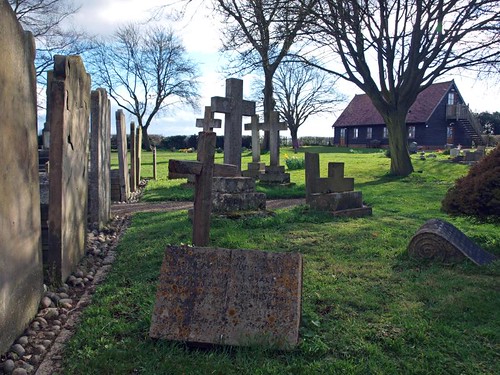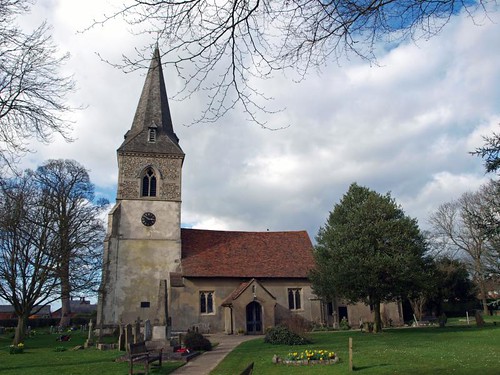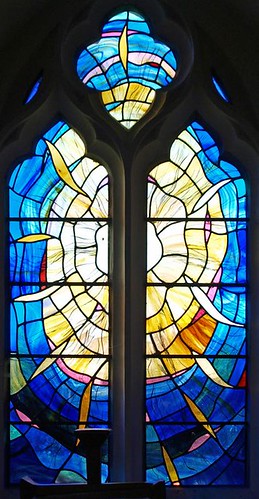I'm afraid, despite the yurt and it being open, I didn't warm to it but have to admit that many other churches I've visited could benefit from the addition of a yurt, after all it does make a distinctive addition.
ALL SAINTS. Small flint church. Nave to which late in the C13 a N aisle was added (arcade of four bays on octagonal piers with slightly hollow-chamfered arches). W tower and chancel C15 (upper stage of the tower 1875, chancel re-modelled C17). The plastered C15 nave roof looks rather domestic with its wind-braces. - FONT. Good C15 work with panelled stem and panelled octagonal bowl. - STAINED GLASS. E window early C19. - In the N aisle W window good c. 1875 glass in the style of Walter Crane. - PLATE. Chalice and Paten, 1569. - MONUMENT. Coffin lid with foliated cross; c. 1300.

Datchworth. Ivied elms and a lonely church spire brave the winds that sweep across this high ledge. The fine modern spire is set on a 14th-century tower. The nave may be Norman, but the aisle and the arcade are late 13th century, a 15th-century arch opening into a patchwork chancel of various ages. The nave roof and the font are both 500 years old, and there is a chair, a chest, and a poor box which have served for 300 years. In a recess is a gravestone carved 600 years ago with a flowery cross, perhaps to cover the body of John de Burgh, the church’s patron, whose widow founded Clare College, Cambridge.
Half a mile to the south is Datchworth Green, where an old whipping-post six feet high, still with its iron handcuffs, stands by some cottages which have been here 300 years. Not far off are two pleasant 17th-century homes, timbered Hoppers Hall and Cherry Tree Farm. Under Datchworth’s yew trees Edward Young, the 18th-century poet then living in retirement at Welwyn, wrote some of his Night Thoughts, his best remembered poem, though by now he might say, as he said of himself in his lifetime “I’ve been so long remembered, I’m forgot.”
Half a mile to the south is Datchworth Green, where an old whipping-post six feet high, still with its iron handcuffs, stands by some cottages which have been here 300 years. Not far off are two pleasant 17th-century homes, timbered Hoppers Hall and Cherry Tree Farm. Under Datchworth’s yew trees Edward Young, the 18th-century poet then living in retirement at Welwyn, wrote some of his Night Thoughts, his best remembered poem, though by now he might say, as he said of himself in his lifetime “I’ve been so long remembered, I’m forgot.”


No comments:
Post a Comment